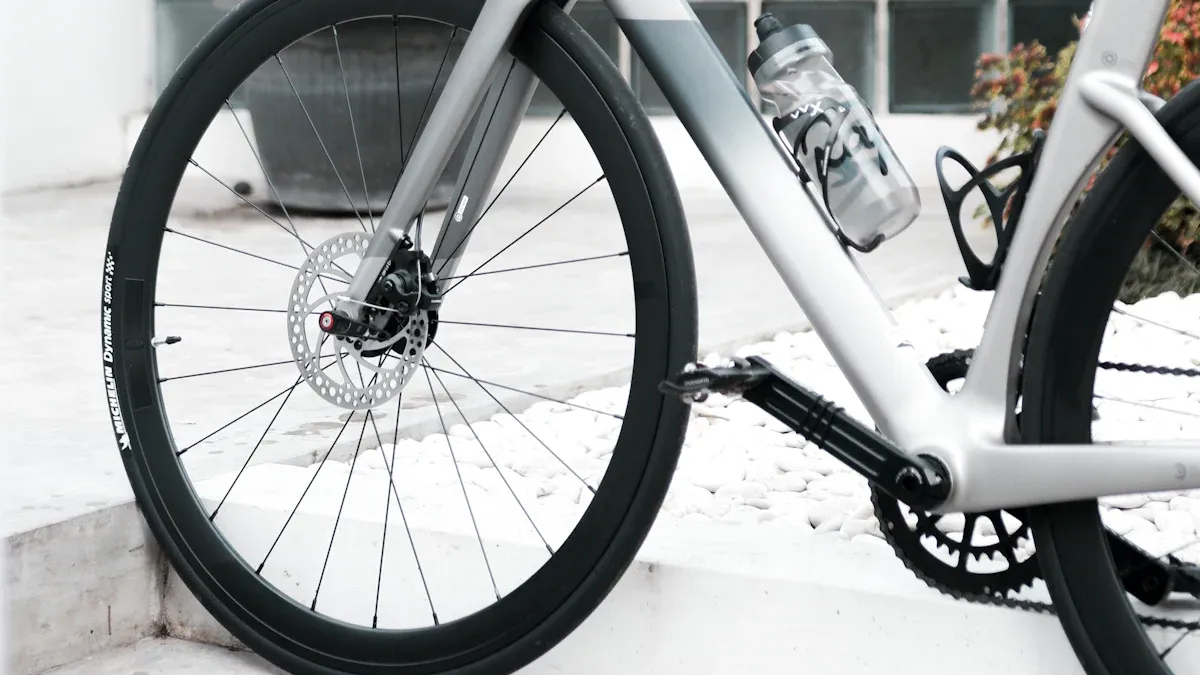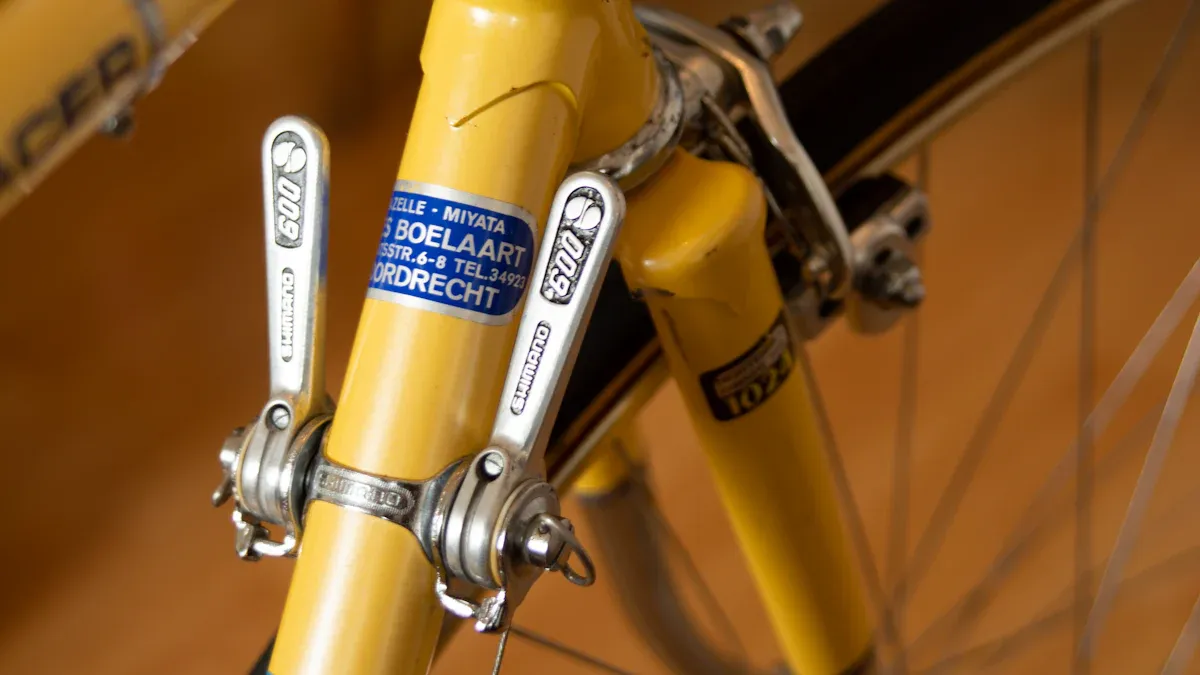
When discussing durability, choosing between a titanium or steel bike frame is essential. Durability plays a crucial role when selecting a bike frame. Cyclists consider factors like strength, weight, and resistance to rust when making their decision. Recent studies indicate that titanium or steel bike frames can last over 20 years with minimal maintenance. While titanium frames are known for their longevity and light weight, steel frames offer exceptional strength but tend to be heavier and more prone to rust. Understanding these differences helps cyclists select the ideal frame for their needs.
Key Takeaways
Titanium bike frames do not rust easily. They last a long time with little care. This makes them great for riders who want something strong and easy to take care of.
Steel frames are strong too. They are easier to fix than titanium. Titanium needs special welding, which can be expensive.
The weight difference between titanium and steel frames is small. Titanium is stronger for its weight and gives a smoother ride.
Titanium frames usually cost more because they use rare materials and are hard to make. Steel frames are cheaper and more common.
Choose titanium for road cycling, mountain biking, and long trips. Pick steel for city riding and touring where easy repairs and cost are important.
MATERIAL STRENGTH

Titanium vs Steel Strength
When we look at the strength of titanium and steel bike frames, both are strong. Titanium, especially the alloy 3AL-2.5V, has a high ultimate tensile strength of 620 MPa and a yield strength of 500 MPa. On the other hand, the common steel alloy 4130 has an ultimate tensile strength of 560 MPa and a yield strength of 460 MPa. The table below shows these numbers:
Material | Ultimate Tensile Strength (MPa) | Yield Strength (MPa) |
|---|---|---|
Titanium alloy 3AL-2.5V | 620 | 500 |
Steel alloy 4130 | 560 | 460 |
This information shows that titanium frames usually have more tensile strength than steel frames. This means they can resist bending better when under pressure.
Weight Comparison
Weight is very important for how a bike performs. Titanium is about half as dense as steel, which makes it lighter. But to be just as stiff, titanium tubes need to be thicker or bigger. This often makes titanium frames weigh about the same as steel frames. In fact, the weight difference between titanium and steel bike frames is small and mostly depends on the design, not just the material.
Here are some points about how weight affects cycling performance:
Titanium frames have a better strength-to-weight ratio, making them lighter but still strong.
The lighter weight helps with quick movements and speed, improving cycling performance.
Titanium’s flexibility helps reduce vibrations, giving a smoother ride and less tiredness on long rides.
Steel frames are strong but heavier and can rust more easily, which can affect how long they last.
DURABILITY ASPECTS

Corrosion Resistance
Corrosion resistance is very important when we compare titanium and steel bike frames. Titanium has excellent corrosion resistance because of its natural oxide layer. This layer forms when titanium meets air. It creates a shield that stops rust. In fact, titanium resists corrosion about ten times better than untreated steel. Steel can rust easily when it gets wet or is in salty places, which often happens while cycling.
The table below shows the corrosion resistance of both materials:
Property | Titanium | Steel |
|---|---|---|
Corrosion Resistance | Excellent due to stable oxide layer | Moderate to high depending on type; untreated steel is prone to rust |
Protective Measures | None needed | Requires galvanization, painting, or coating |
Application Context | Marine and harsh environments | Outdoor and marine (stainless steel) |
This great corrosion resistance means titanium bike frames last longer and need less care. Cyclists can trust titanium bikes to stay in good shape for years with little work. On the other hand, steel frames need regular care to stop rust, especially in wet or salty areas.
Repairability of Steel vs Titanium
When we talk about repairability, steel frames are much easier to fix than titanium frames. Fixing titanium bike frames can be tricky. For example, welding titanium needs an inert gas atmosphere, like argon. This stops oxygen and nitrogen from getting in. If they do, it can make the metal weak and crack. Cracks near welds on titanium frames happen often and can be hard to fix. Some stress cracks might even be impossible or unsafe to repair.
In contrast, fixing steel frames is usually easier and cheaper. Steel frames can be welded without strict rules like titanium. This makes repairs simpler and less costly. While titanium frames often come with long or lifetime warranties, damage from crashes or bad welding usually isn’t covered.
Here are some key points about the repairability of both materials:
Titanium repairs are hard and expensive because of special welding needs.
Steel frames are easier and cheaper to fix, making them better for many cyclists.
The skill of the welder greatly affects how well titanium repairs work.
Overall, while titanium frames are very durable, their repair issues can be a downside compared to the easier maintenance of steel bike frames.
COST AND LONGEVITY
Initial Costs
When we look at the initial costs of titanium and steel bike frames, titanium frames usually cost more. The reasons for this higher price include:
Limited raw materials available.
Complicated manufacturing processes.
The high cost due to titanium’s strength and resistance to rust.
On the other hand, steel frames are cheaper to make. They are a traditional material with well-known manufacturing methods. This price difference can make some buyers choose steel over titanium, which may slow down titanium’s market growth.
Longevity and Maintenance
Both titanium and steel bike frames last a long time, but they need different care. Titanium frames can last for many years with little maintenance. Their great resistance to rust means they need less frequent care. Cyclists can rely on a titanium frame to stay in good shape for a long time.
Steel frames are strong but often need more attention. They can rust if not taken care of, especially in wet or salty places. Regular cleaning and protective coatings are important to help them last longer.
Warranty details also matter when looking at longevity. The table below shows warranty lengths from top manufacturers:
Manufacturer | Frame Material | Warranty Duration (Original Owner) | Coverage Details | Crash Replacement Policy |
|---|---|---|---|---|
Reilly Titanium Co. | Titanium | Lifetime | Covers material defects; needs registration; excludes misuse, negligence, unauthorized repairs, extreme use, corrosion | Discounted replacement once; discretionary; excludes labor, shipping, paint |
Steel | 10 years | Covers material defects; same exclusions as titanium | Same as titanium frame policy | |
Curve Cycling | Titanium | 5 years | Covers defects; excludes misuse and improper use; crash replacement offered at discretion | Discounted crash replacement up to 5 years; original owner only (except titanium frames where all owners covered) |
Steel | 2 years | Similar coverage and exclusions as titanium; crash replacement offered | Discounted crash replacement up to 2 years; original owner only |
This comparison shows that Reilly provides much longer warranty periods for both titanium and steel frames than Curve Cycling. The lifetime warranty on titanium frames versus 5 years, and 10 years on steel versus 2 years, shows how much confidence manufacturers have in their products’ durability.
REAL-WORLD APPLICATIONS
Best Uses for Titanium Bikes
Titanium bikes are great for many cycling activities because of their special features. Here are some good uses:
Road Cycling: Titanium frames are comfortable and perform well. They absorb shocks nicely, making them perfect for long rides on smooth roads.
Mountain Biking: Titanium mountain bikes work well on trails. Their strength-to-weight ratio helps them be quick and stable on bumpy paths.
Adventure Cycling: These bikes are great for bike-packing and gravel racing. They handle tough conditions while keeping you comfortable.
Touring: Titanium touring bikes are light and strong. They are made for long trips and can carry heavy loads without losing performance.
In general, titanium bikes are good for long rides and short trips on different terrains, like gravel and uphill paths.
Best Uses for Steel Frames
Steel frames also have benefits, especially for city commuting and touring. The table below shows how they perform compared to titanium frames:
Aspect | Steel Frames | Titanium Frames |
|---|---|---|
Comfort | Smaller tubes give good comfort, almost as nice as titanium but a bit less smooth. | More comfortable and better at absorbing bumps, making rides smoother on rough city and touring paths. |
Durability | Strong but can rust without paint or coating; less resistant to wear. | Very resistant to rust; can be left unpainted; has a limit that prevents breaking; bends more without damage; can last a lifetime. |
Efficiency | Heavier; smaller tubes make it less stiff and efficient for power transfer. | Lighter (about half the weight of steel); can use bigger tubes without adding weight, improving stiffness and power for longer rides. |
Steel bikes are great for city commuting because they are strong and comfortable. They work well in many conditions but need regular care to avoid rust.
In conclusion, titanium and steel bike frames have different benefits when it comes to durability. Titanium frames are great at resisting rust and last a long time. This makes them perfect for riders who want less maintenance. Steel frames are very strong and easy to repair, which is good for those who want simple fixes.
For road cycling and adventure biking, titanium frames are the best choice. For city commuting and touring, steel frames usually work better. Cyclists should pick the frame that fits their needs and riding situations.
FAQ
What are the main advantages of titanium bike frames?
Titanium frames resist rust very well. They have a great strength-to-weight ratio and last a long time. They need little care and give a smooth ride. This makes them perfect for many cycling activities.
How do steel bike frames compare in terms of weight?
Steel frames are usually heavier than titanium frames. But they still offer good strength and durability. The weight difference often depends on how the frame is designed and the tubes used.
Can titanium bike frames be repaired easily?
Fixing titanium frames is hard. It needs special welding methods to keep the metal strong. On the other hand, steel frames are easier and cheaper to fix, which helps many cyclists.
How does the cost of titanium and steel frames differ?
Titanium frames usually cost more because the material is rare and hard to make. Steel frames are cheaper, making them a popular choice for people on a budget.
Which frame material is better for long-distance touring?
Titanium frames are better for long-distance touring. They are light and resist rust, allowing for comfortable rides over long times. Steel frames can work too but need more care to stop rust.
See Also
Key Features That Make Titanium Bike Frames Unique
A Buyer’s Guide to Carbon Aluminum And Steel Frames
Advantages And Disadvantages Of Aluminum Frame Strength
Comparing Enduro Frame Materials For Durability And Power
Evaluating Steel Mountain Bike Frames: Benefits And Drawbacks
